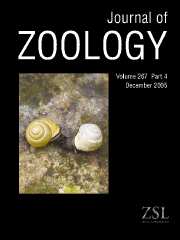Crossref Citations
This article has been cited by the following publications. This list is generated based on data provided by
Crossref.
Lindsey, Peter A.
du Toit, Johan T.
and
Mills, M.G.L.
2005.
Attitudes of ranchers towards African wild dogs Lycaon pictus: Conservation implications on private land.
Biological Conservation,
Vol. 125,
Issue. 1,
p.
113.
Lindsey, Peter A.
Alexander, Robert R.
du Toit, Johan T.
and
Mills, M.G.L.
2005.
The potential contribution of ecotourism to African wild dog Lycaon pictus conservation in South Africa.
Biological Conservation,
Vol. 123,
Issue. 3,
p.
339.
2006.
Verhaltensbiologie.
p.
137.
Hayward, Matt W.
O'Brien, John
Hofmeyr, Markus
and
Kerley, Graham I. H.
2006.
PREY PREFERENCES OF THE AFRICAN WILD DOG LYCAON PICTUS (CANIDAE: CARNIVORA): ECOLOGICAL REQUIREMENTS FOR CONSERVATION.
Journal of Mammalogy,
Vol. 87,
Issue. 6,
p.
1122.
Woodroffe, Rosie
Lindsey, Peter A.
Romañach, Stephanie S.
and
Ranah, Symon M. K. ole
2007.
African Wild Dogs (Lycaon pictus) Can Subsist on Small Prey: Implications for Conservation.
Journal of Mammalogy,
Vol. 88,
Issue. 1,
p.
181.
Buettner, U. K.
Davies‐Mostert, H. T.
Du Toit, J. T.
and
Mills, M. G. L.
2007.
Factors affecting juvenile survival in African wild dogs (Lycaon pictus) in Kruger National Park, South Africa.
Journal of Zoology,
Vol. 272,
Issue. 1,
p.
10.
Cooper, Andrew B.
Pettorelli, Nathalie
and
Durant, Sarah M.
2007.
Large carnivore menus: factors affecting hunting decisions by cheetahs in the Serengeti.
Animal Behaviour,
Vol. 73,
Issue. 4,
p.
651.
2009.
Verhaltensbiologie.
p.
145.
Wang, S. W.
and
Macdonald, D. W.
2009.
Feeding habits and niche partitioning in a predator guild composed of tigers, leopards and dholes in a temperate ecosystem in central Bhutan.
Journal of Zoology,
Vol. 277,
Issue. 4,
p.
275.
Shultz, Susanne
and
Finlayson, Laura V.
2010.
Large body and small brain and group sizes are associated with predator preferences for mammalian prey.
Behavioral Ecology,
Vol. 21,
Issue. 5,
p.
1073.
Hayward, Matt W.
Hayward, Gina J.
Tambling, Craig J.
Kerley, Graham I. H.
and
Getz, Wayne M.
2011.
Do Lions Panthera leo Actively Select Prey or Do Prey Preferences Simply Reflect Chance Responses via Evolutionary Adaptations to Optimal Foraging?.
PLoS ONE,
Vol. 6,
Issue. 9,
p.
e23607.
Bujoczek, Małgorzata
Ciach, Michał
and
Yosef, Reuven
2011.
Road-kills affect avian population quality.
Biological Conservation,
Vol. 144,
Issue. 3,
p.
1036.
Pettorelli, Nathalie
Coulson, Tim
Durant, Sarah M.
and
Gaillard, Jean-Michel
2011.
Predation, individual variability and vertebrate population dynamics.
Oecologia,
Vol. 167,
Issue. 2,
p.
305.
Donadio, Emiliano
Buskirk, Steven W.
and
Novaro, Andrés J.
2012.
Juvenile and adult mortality patterns in a vicuña (Vicugna vicugna) population.
Journal of Mammalogy,
Vol. 93,
Issue. 6,
p.
1536.
Kappeler, Peter M.
2012.
Verhaltensbiologie.
p.
148.
Azevedo, F. C. C.
Verdade, L. M.
and
Braae, Anne
2012.
Predator–prey interactions: jaguar predation on caiman in a floodplain forest.
Journal of Zoology,
Vol. 286,
Issue. 3,
p.
200.
Metz, Matthew C.
Smith, Douglas W.
Vucetich, John A.
Stahler, Daniel R.
and
Peterson, Rolf O.
2012.
Seasonal patterns of predation for gray wolves in the multi‐prey system of Yellowstone National Park.
Journal of Animal Ecology,
Vol. 81,
Issue. 3,
p.
553.
Mbizah, Moreangels M.
Marino, Jorgelina
and
Groom, Rosemary J.
2012.
Diet of Four Sympatric Carnivores in Savé Valley Conservancy, Zimbabwe: Implications for Conservation of the African Wild Dog (Lycaon pictus).
South African Journal of Wildlife Research,
Vol. 42,
Issue. 2,
p.
94.
Ramnanan, Rivona
Swanepoel, Lourens H.
and
Somers, Michael J.
2013.
The Diet and Presence of African Wild Dogs (Lycaon pictus) on Private Land in the Waterberg Region, South Africa.
South African Journal of Wildlife Research,
Vol. 43,
Issue. 1,
p.
68.
Davies‐Mostert, Harriet T.
Mills, Michael G. L.
Macdonald, David W.
and
Dickman, Christopher
2013.
Hard boundaries influence African wild dogs' diet and prey selection.
Journal of Applied Ecology,
Vol. 50,
Issue. 6,
p.
1358.


